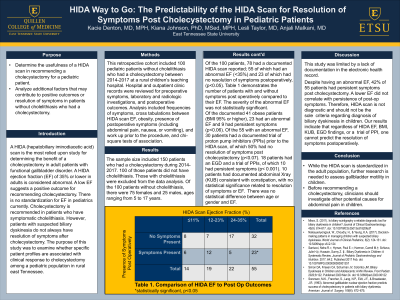Back


Poster Session A - Sunday Afternoon
Category: Pediatrics
A0604 - HIDA Way to Go? The Predictability of the HIDA Scan for Resolution of Symptoms Post Cholecystectomy in Pediatric Patients
Sunday, October 23, 2022
5:00 PM – 7:00 PM ET
Location: Crown Ballroom

Has Audio

Kacie H. Denton, MD, MPH
East Tennessee State University
Johnson City, TN
Presenting Author(s)
Kacie H. Denton, MD, MPH1, Patrick Costello, MD2, Kiana Johnson, PhD, MSEd, MPH1, Anjali Malkani, MD1
1East Tennessee State University, Johnson City, TN; 2Watauga Pathology, Johnson City, TN
Introduction: A HIDA (hepatobiliary iminodiacetic acid) scan is the most relied upon study for determining the benefit of a cholecystectomy in adult patients. A HIDA ejection fraction (EF) of 35% or lower in adults is considered abnormal; there is no standardization in pediatrics at this time. The purpose of this study was to examine whether specific patient profiles are associated with clinical response to cholecystectomy among a pediatric population in rural east Tennessee.
Methods: This retrospective cohort included 100 pediatric patients without cholelithiasis who had a cholecystectomy between 2014-2017 at a rural children’s teaching hospital. Hospital and outpatient clinic records were reviewed for preoperative symptoms, laboratory and radiologic investigations, and postoperative outcomes. Analysis included frequencies of symptoms, cross tabulations between HIDA scan EF, obesity, presence of postoperative symptoms (including abdominal pain, nausea, or vomiting), and work up prior to the procedure, and chi-square tests of association.
Results: Of the 100 patients, 78 had a documented HIDA scan reported; 55 of which had an abnormal EF (< 35%) and 23 of which had no resolution of symptoms postoperatively, (p< 0.05). Of the documented 41 obese patients, 23 had an abnormal EF and 9 had persistent symptoms (p< 0.058). Of the 55 with an abnormal EF, 30 patients had a documented trial of proton pump inhibitors (PPIs) prior to the HIDA scan, of which 50% had no resolution of symptoms post cholecystectomy (p< 0.066). 18 patients had an EGD and a trial of PPIs, of which 10 had persistent symptoms (p< 0.001). 10 patients had documented abdominal Xray (KUB) consistent with constipation, with no statistical significance related to resolution of symptoms or EF.
Discussion: This study was limited by lack of documentation in the electronic health record.
Despite having an abnormal EF, 42% of patients had persistent symptoms post cholecystectomy. Therefore, the HIDA scan is not diagnostic and should not be the sole diagnostic criteria regarding biliary dyskinesia in children. Our results indicate that regardless of HIDA EF, BMI, KUB, EGD findings, or a trial of PPI, one cannot predict the resolution of symptoms postoperatively. While the HIDA scan is standardized in the adult population, further research is needed to assess gallbladder motility in children. Hence, before recommending a cholecystectomy, clinicians should investigate other potential differentials for abdominal pain.
Disclosures:
Kacie H. Denton, MD, MPH1, Patrick Costello, MD2, Kiana Johnson, PhD, MSEd, MPH1, Anjali Malkani, MD1. A0604 - HIDA Way to Go? The Predictability of the HIDA Scan for Resolution of Symptoms Post Cholecystectomy in Pediatric Patients, ACG 2022 Annual Scientific Meeting Abstracts. Charlotte, NC: American College of Gastroenterology.
1East Tennessee State University, Johnson City, TN; 2Watauga Pathology, Johnson City, TN
Introduction: A HIDA (hepatobiliary iminodiacetic acid) scan is the most relied upon study for determining the benefit of a cholecystectomy in adult patients. A HIDA ejection fraction (EF) of 35% or lower in adults is considered abnormal; there is no standardization in pediatrics at this time. The purpose of this study was to examine whether specific patient profiles are associated with clinical response to cholecystectomy among a pediatric population in rural east Tennessee.
Methods: This retrospective cohort included 100 pediatric patients without cholelithiasis who had a cholecystectomy between 2014-2017 at a rural children’s teaching hospital. Hospital and outpatient clinic records were reviewed for preoperative symptoms, laboratory and radiologic investigations, and postoperative outcomes. Analysis included frequencies of symptoms, cross tabulations between HIDA scan EF, obesity, presence of postoperative symptoms (including abdominal pain, nausea, or vomiting), and work up prior to the procedure, and chi-square tests of association.
Results: Of the 100 patients, 78 had a documented HIDA scan reported; 55 of which had an abnormal EF (< 35%) and 23 of which had no resolution of symptoms postoperatively, (p< 0.05). Of the documented 41 obese patients, 23 had an abnormal EF and 9 had persistent symptoms (p< 0.058). Of the 55 with an abnormal EF, 30 patients had a documented trial of proton pump inhibitors (PPIs) prior to the HIDA scan, of which 50% had no resolution of symptoms post cholecystectomy (p< 0.066). 18 patients had an EGD and a trial of PPIs, of which 10 had persistent symptoms (p< 0.001). 10 patients had documented abdominal Xray (KUB) consistent with constipation, with no statistical significance related to resolution of symptoms or EF.
Discussion: This study was limited by lack of documentation in the electronic health record.
Despite having an abnormal EF, 42% of patients had persistent symptoms post cholecystectomy. Therefore, the HIDA scan is not diagnostic and should not be the sole diagnostic criteria regarding biliary dyskinesia in children. Our results indicate that regardless of HIDA EF, BMI, KUB, EGD findings, or a trial of PPI, one cannot predict the resolution of symptoms postoperatively. While the HIDA scan is standardized in the adult population, further research is needed to assess gallbladder motility in children. Hence, before recommending a cholecystectomy, clinicians should investigate other potential differentials for abdominal pain.
Disclosures:
Kacie Denton indicated no relevant financial relationships.
Patrick Costello indicated no relevant financial relationships.
Kiana Johnson indicated no relevant financial relationships.
Anjali Malkani indicated no relevant financial relationships.
Kacie H. Denton, MD, MPH1, Patrick Costello, MD2, Kiana Johnson, PhD, MSEd, MPH1, Anjali Malkani, MD1. A0604 - HIDA Way to Go? The Predictability of the HIDA Scan for Resolution of Symptoms Post Cholecystectomy in Pediatric Patients, ACG 2022 Annual Scientific Meeting Abstracts. Charlotte, NC: American College of Gastroenterology.
